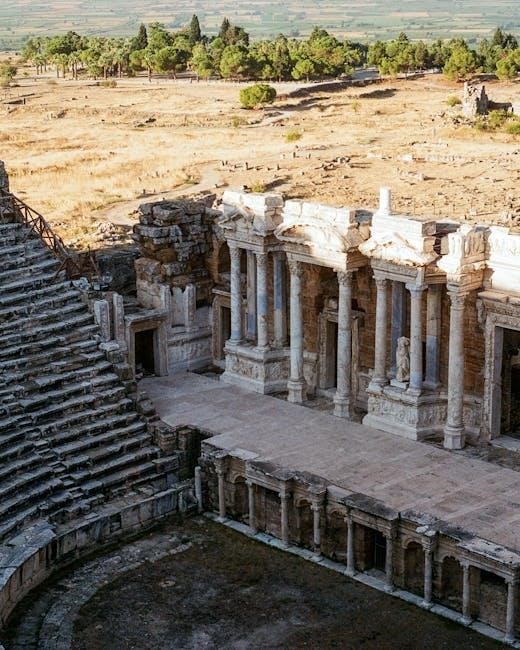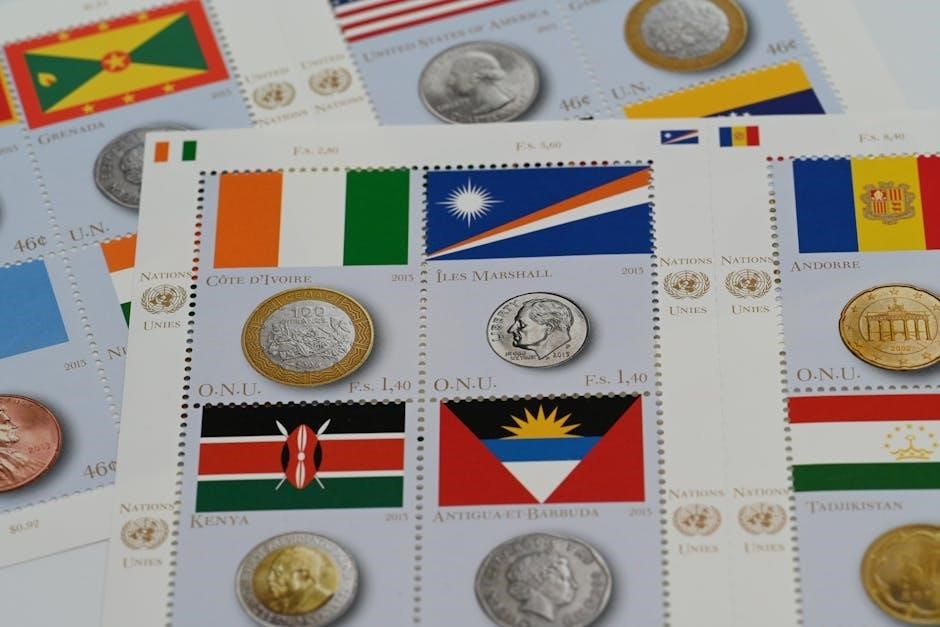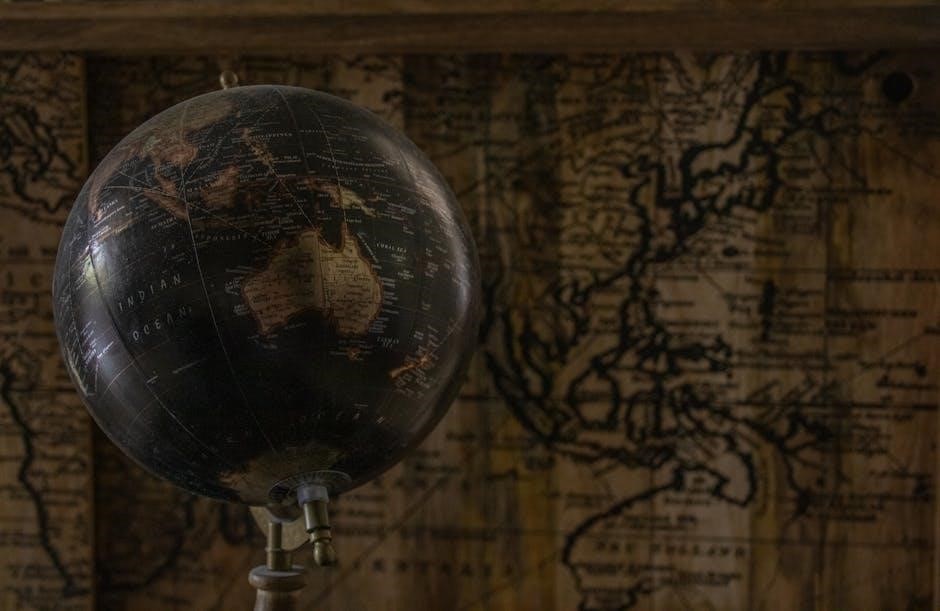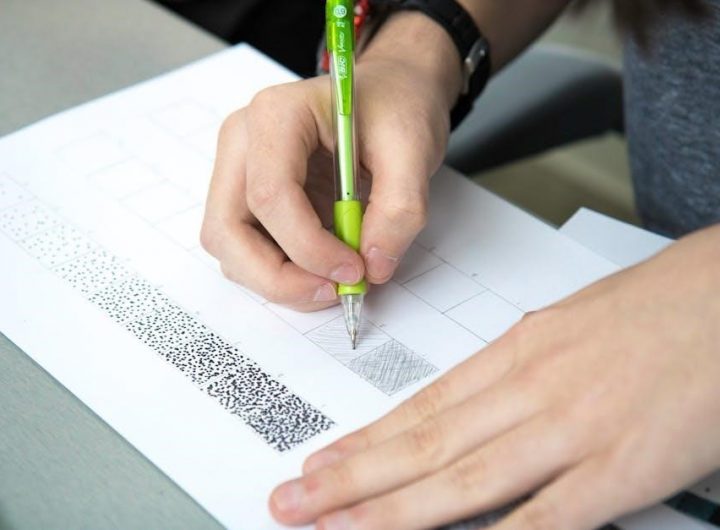
Importance of World History Multiple Choice Questions
World history multiple choice questions enhance retention and understanding by testing factual recall and analytical skills. They identify knowledge gaps, allowing focused study and improvement.
1.1 Enhancing Retention and Understanding
Multiple choice questions in world history improve retention by reinforcing memory of key events and concepts through repetition. They enhance understanding by testing the ability to apply knowledge in different contexts, ensuring students grasp historical developments and their significance. Regular practice with MCQs helps learners identify and address gaps in their knowledge effectively.
1.2 Identifying Knowledge Gaps
World history multiple choice questions help identify knowledge gaps by revealing areas where students struggle with concepts or events. Incorrect answers pinpoint weaknesses, guiding focused study and improvement. Regular practice with MCQs ensures learners address these gaps effectively, fostering a deeper understanding of historical themes and events over time.

Structure of World History Multiple Choice Questions
World history MCQs are structured around historical events, cultural comparisons, and cause-effect analyses, providing a clear framework for organizing and testing knowledge of global historical developments.
2.1 Historical Events and Dates
Historical events and dates form the cornerstone of world history MCQs, testing students’ ability to recall key milestones. These questions often focus on major revolutions, empires, and conflicts, ensuring a strong chronological understanding. By emphasizing precise dates and their significance, they help students build a coherent timeline of global developments, fostering a deeper grasp of historical context and progression over time.
2.2 Cultural and Social Comparisons
Cultural and social comparison questions in world history MCQs encourage students to analyze similarities and differences across societies. These inquiries focus on themes like religious practices, political systems, and social structures, fostering critical thinking about diverse civilizations. By comparing cultures, students gain insights into global patterns and unique traditions, enhancing their understanding of human experiences across time and space.
2.3 Cause-and-Effect Analysis
Cause-and-effect questions in world history MCQs challenge students to explore the motivations and outcomes of significant events. These questions require analyzing historical actions and their consequences, such as the impact of revolutions or trade routes. By evaluating these relationships, students develop a deeper understanding of how events shape global dynamics and societal transformations, fostering analytical and problem-solving skills.
Strategies for Answering Multiple Choice Questions
Effective strategies include eliminating incorrect options, using contextual clues, and managing time wisely. These approaches enhance accuracy and confidence, helping students navigate exams efficiently and achieve better results.
3.1 Eliminating Incorrect Options
Eliminating incorrect options is a strategic approach to narrowing down choices. By identifying clearly wrong answers, students increase their chances of selecting the correct one. This method helps manage time and reduces anxiety, especially in timed exams. It also refines critical thinking, making it easier to focus on plausible answers and improve overall performance effectively.
3.2 Using Contextual Clues
Using contextual clues involves analyzing the question and answer options to identify hints that point to the correct answer. This strategy leverages the surrounding information to make informed decisions, especially when prior knowledge is limited. Contextual clues help eliminate incorrect options and make educated guesses, improving accuracy and confidence in selecting the right answer effectively.
Resources for World History Multiple Choice Questions
Free PDF downloads and textbooks serve as key resources for world history multiple choice questions, assisting in exam preparation and thorough studying.
4.1 Free PDF Downloads
Free PDF downloads offer convenient access to world history multiple choice questions, providing practice exams, answer keys, and study guides. These resources are widely available online, covering various historical periods and events. They are ideal for self-study and exam preparation, allowing students to test their knowledge and identify areas for improvement. Many PDFs are sourced from educational websites and platforms.
4.2 Textbooks and Study Guides
Textbooks and study guides are essential resources for world history multiple choice questions. They provide comprehensive coverage of historical events, cultural comparisons, and cause-effect analysis. Many include practice questions, making them ideal for exam preparation. Popular textbooks like those from College Board and educational publishers offer structured learning, ensuring students grasp key concepts and themes effectively for their exams and academic success.
Practice Exams and Simulations
Practice exams and simulations are crucial for assessing readiness and improving test-taking skills. They provide a realistic experience, helping students refine strategies and identify areas for further study.
5.1 Timed Practice Sessions
Timed practice sessions simulate real exam conditions, helping students manage time effectively. By adhering to strict deadlines, learners enhance their speed and accuracy, ensuring they can complete all questions within the allotted time; Regular timed drills improve test-taking stamina and reduce anxiety, fostering a confident approach to multiple-choice assessments. This method is vital for optimal performance.
5.2 Reviewing Answers and Explanations
Reviewing answers and explanations after practice exams is crucial for understanding mistakes. Detailed feedback helps students grasp their errors, reinforcing learning and improving future performance. Explanations often include historical context, enhancing comprehension of complex topics and ensuring long-term retention of key concepts. This step is essential for refining knowledge and developing a deeper understanding of world history.

Tips for Effective Test-Taking
Read questions carefully to ensure understanding; Manage time effectively, allocating minutes per question. Stay calm and systematic to maximize scores and accuracy in world history exams.
6.1 Reading Questions Carefully
Reading questions carefully is crucial for understanding their intent and requirements. Identify key terms, analyze options, and avoid rushing. This ensures accurate responses and minimizes errors in world history exams. Properly interpreting each question saves time and improves performance. Always look for contextual clues and focus on the question’s core to select the best answer efficiently.
6.2 Managing Time Effectively
Managing time effectively is vital for success in world history exams. Allocate a set amount of time per question to avoid spending too long on one. Use timed practice sessions to build stamina and improve speed. Prioritize questions you’re confident about first, then return to challenging ones. This strategy reduces anxiety and ensures you complete the exam efficiently, allowing time to review answers.

Common Themes in World History Questions
World history questions often focus on major revolutions, imperialism, political systems, economic developments, and cultural interactions. These themes provide insights into global patterns and transformations over time.
7.1 Major Revolutions
Major revolutions, such as the American, French, and Industrial Revolutions, are central to world history multiple choice questions. These questions assess understanding of causes, effects, and key figures, helping students analyze historical transformations and their global impact. They also evaluate critical thinking skills by linking revolutions to broader themes like political change and economic development.
7.2 Imperialism and Colonization
Multiple choice questions on imperialism and colonization focus on understanding motivations, impacts, and key events. They assess knowledge of European expansion, economic exploitation, and cultural exchanges. Questions also explore the effects on indigenous populations and the legacy of colonialism. These MCQs help students analyze complex historical relationships and their influence on modern global dynamics and cultural identities.

The Role of Technology in Learning
Technology enhances learning through digital platforms and AI tools, providing interactive resources and personalized practice questions for world history multiple choice exams, improving accessibility and engagement for students;
8.1 Digital Platforms for Practice
Digital platforms offer interactive tools for practicing world history multiple choice questions, enhancing engagement and accessibility. Resources like Google Maps provide historical context, while PDF materials and online quizzes enable focused study. These platforms allow students to test knowledge, track progress, and access explanations, fostering deeper understanding and retention of key historical concepts and events.
8.2 AI Tools for Question Generation
AI tools revolutionize question creation by generating multiple-choice queries on world history topics. Platforms like iAsk.Ai and ChatGPT enable educators to craft tailored questions quickly, saving time. These tools also provide instant answers and explanations, enhancing student engagement and understanding. AI-driven question generation ensures diverse and relevant practice materials, catering to various learning needs and promoting effective study habits for history enthusiasts and exam preparation.
Scoring and Interpretation
Understanding scoring systems helps assess performance accurately. Analyzing results reveals strengths and weaknesses, guiding focused improvement in world history multiple-choice question preparation and mastery.
9.1 Understanding Scoring Systems
Scoring systems for world history multiple-choice questions typically allocate points based on correct answers, with penalties for incorrect or blank responses. Grading rubrics ensure consistency, allowing students to track progress. Understanding these systems helps set realistic goals and interpret performance effectively, ensuring accurate self-assessment and targeted improvement in historical knowledge and exam strategy.
9.2 Analyzing Results for Improvement
Analyzing results from world history multiple-choice questions helps identify strengths and weaknesses. Reviewing incorrect answers reveals knowledge gaps, enabling targeted study. Tracking progress over time highlights improvement areas, while post-exam resources, like explanations, deepen understanding. This iterative process enhances learning efficiency and exam performance, ensuring students refine their strategies and master historical concepts effectively.

Future Trends in Multiple Choice Assessments
Future trends include interactive PDFs with multimedia links and real-time feedback, enhancing engagement. Gamification elements like badges and leaderboards will make learning more dynamic and competitive, fostering deeper understanding and retention of world history concepts.
10.1 Interactive PDFs
Interactive PDFs are revolutionizing learning by embedding multimedia links, real-time feedback, and clickable elements. These dynamic documents enhance engagement, allowing students to access relevant resources and track progress. They support various learning styles with audio, video, and interactive questions, making world history more accessible and immersive for diverse learners while fostering deeper understanding and retention of key concepts.
10.2 Gamification of Learning
Gamification of learning transforms education into an engaging experience by incorporating game-like elements. Points, badges, and leaderboards motivate students to participate actively. Interactive platforms and apps turn world history into a competitive yet enjoyable journey, fostering a deeper connection to the subject while promoting healthy competition and sustained engagement among learners of all ages.
 what stock trade in conjunction with qqq options pdf
what stock trade in conjunction with qqq options pdf  the very hungry caterpillar printables pdf free
the very hungry caterpillar printables pdf free  ged social studies practice test pdf
ged social studies practice test pdf  i modi the sixteen pleasures pdf
i modi the sixteen pleasures pdf  elliott wave theory pdf
elliott wave theory pdf  medium sudoku printable pdf
medium sudoku printable pdf  lifebreath digital wall control manual
lifebreath digital wall control manual